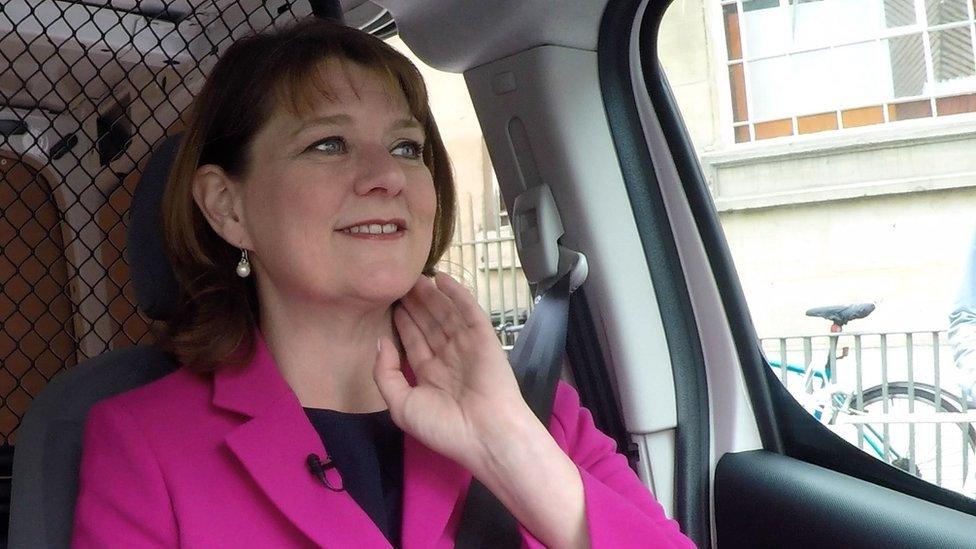Who is Leanne Wood? A profile of the Plaid Cymru leader
- Published
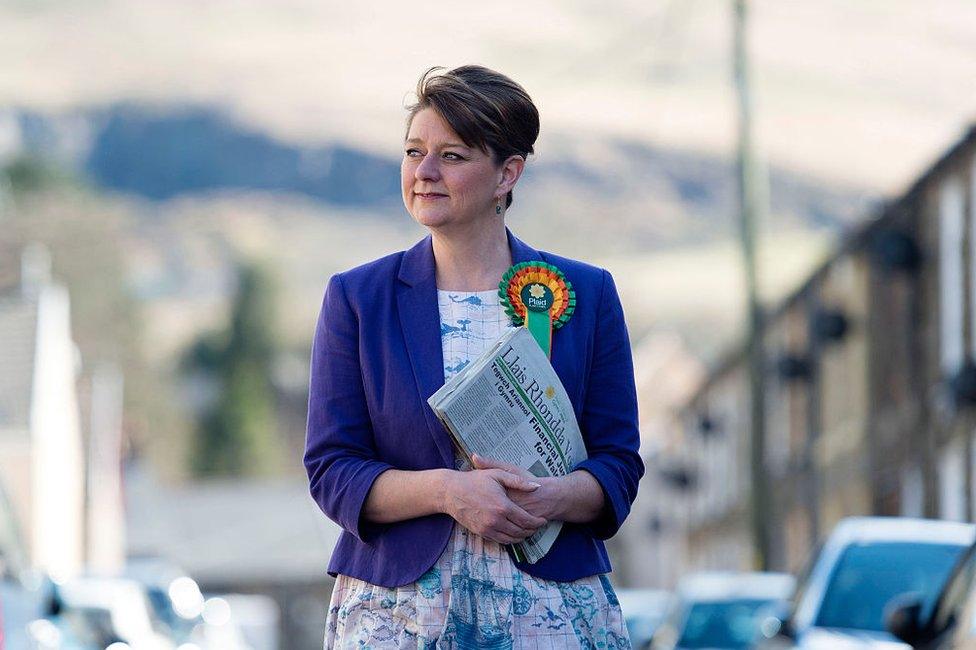
When Plaid Cymru started looking for a new leader in 2011, Leanne Wood faced rival candidates grounded in the party's Welsh-speaking heartlands.
But it became apparent that Plaid members wanted change.
They found it offered by a left winger from a non-Welsh speaking background in the former industrial valleys of south Wales.
She won a decisive victory and took the Labour stronghold of Rhondda, her home patch, at last year's assembly election.
But success with the wider electorate in the rest of Wales has not come so readily.
Born in 1971 to parents Jeff and Avril, she and her sister Joanna were raised in the village of Penygraig.
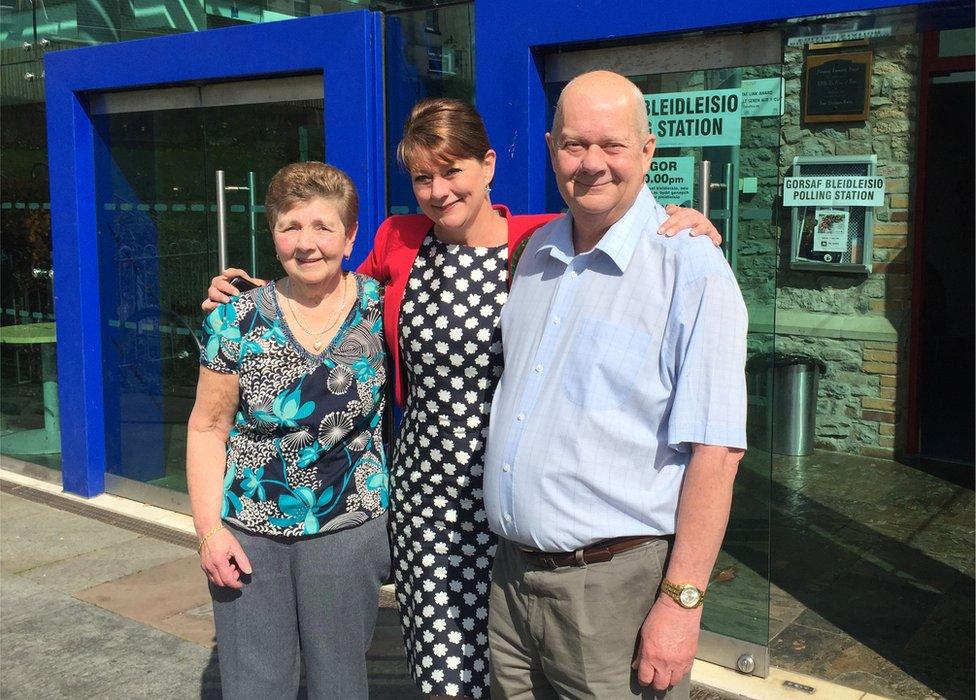
With parents Jeff and Avril in the former mining village of Penygraig where she lives on the street where her grandparents lived
She still lives there with her partner, Ian, and daughter, Cerys.
Their private life is just that - private.
Though she has spoken frequently about how her working-class upbringing shaped her politics, she keeps her family away from the media.
Understanding why she has stayed so close to home is crucial to understanding her politics, says Plaid AM Adam Price, a long-time friend and ally.
"She sees the role of a politician that you represent the people in whose community you live and you have a real sense of what matters to them because you live among them," he says.
Witnessing the decline of those communities and the miners' strikes of the 1980s was a political awakening.
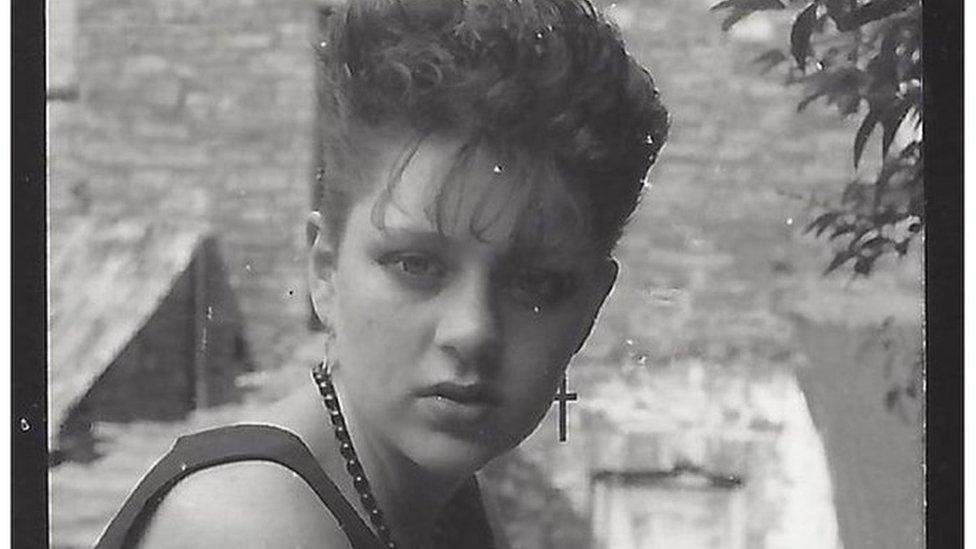
Described as very clever by school friends, Leanne Wood became interested in political issues around the time of the miners' strike in 1984-85
She has recalled how her father was laid off from the builders' yard where he worked, and talked about the experience of joining a separate queue for free school dinners.
"I understand what struggling means," she wrote on her website.
While at Tonypandy Community College - or "Pandy Comp" - she had no intention of going into politics, dreaming instead of becoming a TV newsreader. Moira Stuart was a role model.
She left school at 16 and got a job in a factory making artificial flowers.
Low pay and poor conditions convinced her to go back and study for A levels.
For many politicised young people from that background, there was a well-trodden path into the Labour Party.
But some thought getting rid of Margaret Thatcher was not enough.
They decided fundamental changes were needed to the way power operates in the UK.

Who is Leanne Wood?
Date of birth: 13 December 1971 (aged 45)
Job: Probation officer, university lecturer, Plaid Cymru leader since 2011
Education: Left Tonypandy Comprehensive at 16 - remembered as "clever" and "great fun" - to work in a factory. Returned to education and graduated from the University of South Wales
Family: Partner Ian and 12-year-old daughter Cerys Amelia
Hobbies: Allotments, where she grows her own vegetables. Beer enthusiast and member of the Campaign for Real Ale. Musical tastes include Catatonia (as seen in "van share" with Victoria Derbyshire), Massive Attack, Bob Marley and Bach. Favourite single... anti-monarchist anthem God Save The Queen by the Sex Pistols

A colleague who has worked closely with her says Leanne Wood saw poverty arrive in the valleys and concluded that "it would never be a priority for a Westminster government and the answers were to be found here in Wales - that we would have to plough our own furrow, shape our own future".
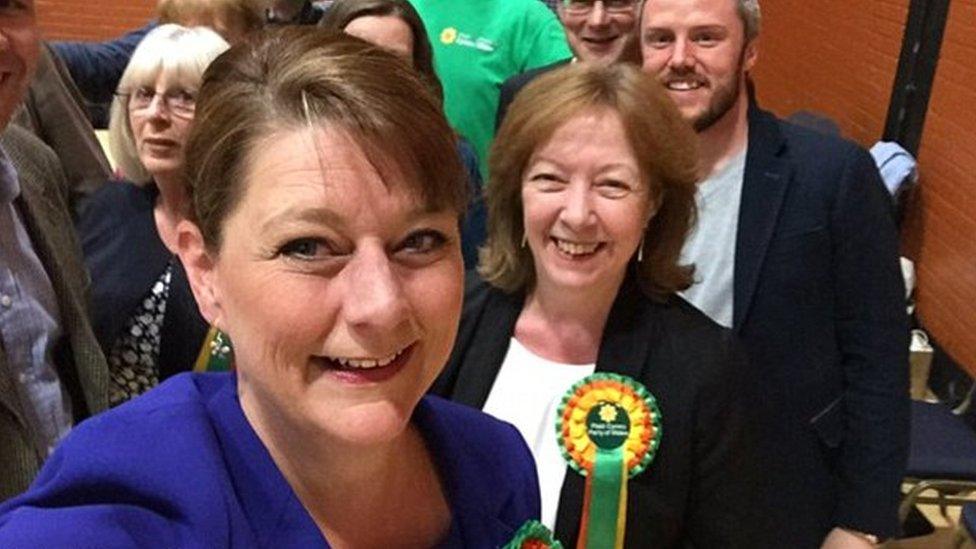
Wood and Jill Evans were arrested in 2007 for blocking a road into Faslane Naval Base, home to Britain's Trident nuclear missile system
"We were abandoned, effectively, by the Labour Party, and seeking a new political home," says Adam Price.
When they found that home, they discovered Plaid could claim its own tradition of radical left-wingers.
Among them was the economist DJ Davies, a founding father of the party who wrote about the economics of Welsh independence. Leanne Wood cites him as an influence.
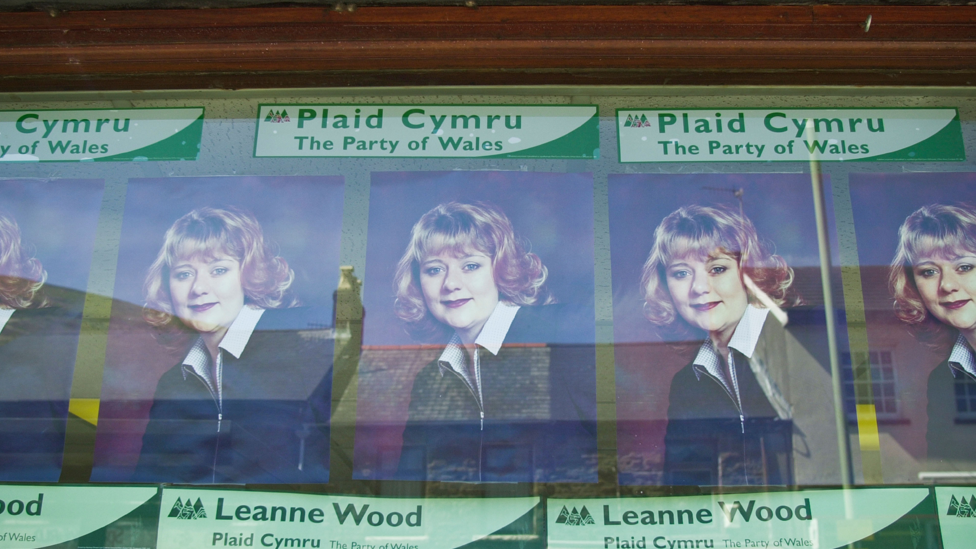
A borough councillor at 25, Leanne Wood became political researcher for Plaid MEP Jill Evans in 2000, a year before launching her campaign as Westminster candidate for Rhondda
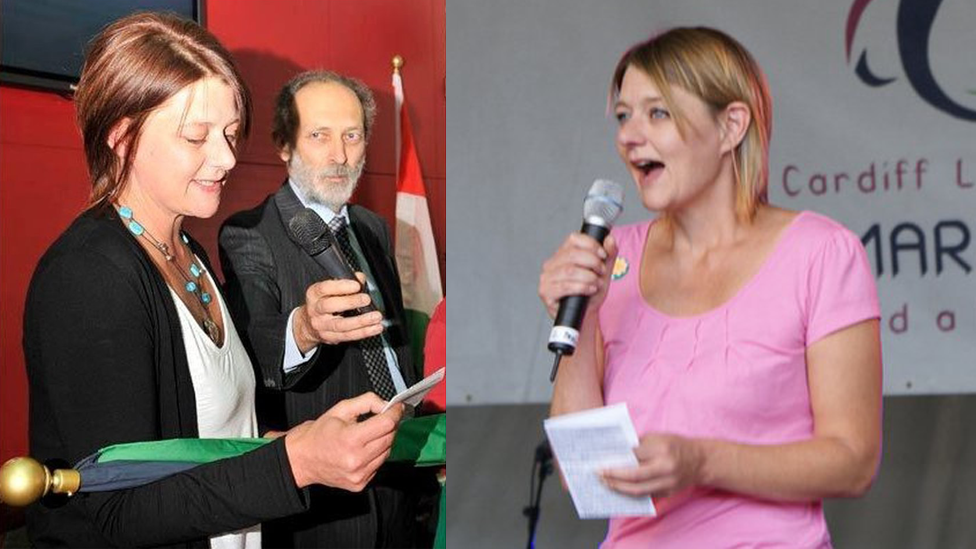
The campaigner - Leanne Wood at the Cardiff Bay Republican Day in 2011 and at the city's LGBT Mardi Gras (r)
After studying at what is now the University of South Wales in nearby Pontypridd, she became a probation officer.
She was a local councillor, worked for the Plaid MEP Jill Evans, and lectured in social policy at Cardiff University, before being elected to the Welsh Assembly in 2003.
The year before, in 2002, her boyfriend, David Ceri Evans, took his own life.
Years later, she spoke to ITV's Good Morning Britain about coping with the tragedy, saying it was "something that is informative to politics because I think my experience having worked as a probation officer as well has meant that I've seen some real difficult experiences that people have had to live through".
Anyone who had never met her before she became an AM could be in no doubt about Ms Wood's politics when she arrived in Cardiff Bay.
A republican, she was once kicked out of the chamber for calling the Queen "Mrs Windsor".
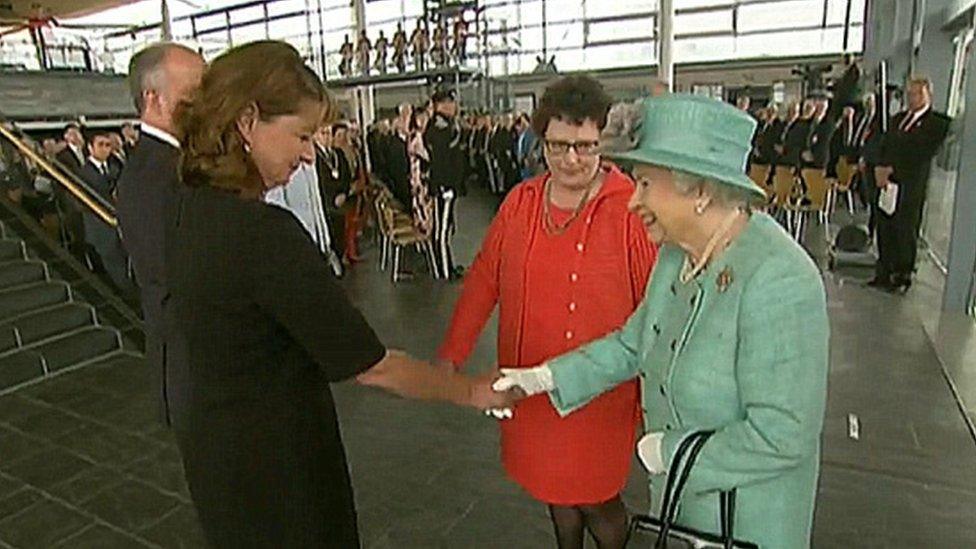
Leanne Wood "inclined her head" instead of curtseying when she met the Queen in Cardiff last year
She was arrested in 2007 at an anti-nuclear protest at the Faslane naval base.
And in the same year she was among four Plaid AMs opposed to a coalition with the Conservatives.
Eventually, the then Plaid leader, Ieuan Wyn Jones, took the party into a coalition with Labour.

In her own words
Setting things straight in a leaders' TV debate when UKIP's Paul Nuttall kept getting her name wrong: "I'm not Natalie, I'm Leanne"
Telling BBC Wales that Brexit was not the only thing on voters' minds before May's local elections: "Most people talk about dog poo"
Her verdict on the Queen's speech in December 2004: "We are more at risk now than we have ever, ever been before and the measures outlined in Mrs Windsor's speech will not address this risk"
Meal times at Tonypandy Comprehensive School: "We were stigmatised for having free school meals. We used to have to stand in a separate queue from the paying children"
At Plaid Cymru's conference in Newport this year: "If you live here and you want to be Welsh then as far as we are concerned, you are Welsh and your rights will be defended by the Party of Wales"

There was no ministerial job for Leanne Wood, leaving her free to roam across subjects.
She delivered a lecture to Plaid activists in 2010 asking whether the party needed a new direction.
The following year she published a pamphlet about an environmentally conscious economic strategy to revive the former coalfields.
It combined two of her passions: co-operative politics and allotments.
When election defeat ushered Mr Jones out of office, Ms Wood started talking about how young Plaid members were encouraging her to stand - a hint that she would offer a break from the cautious, centrist Mr Jones.
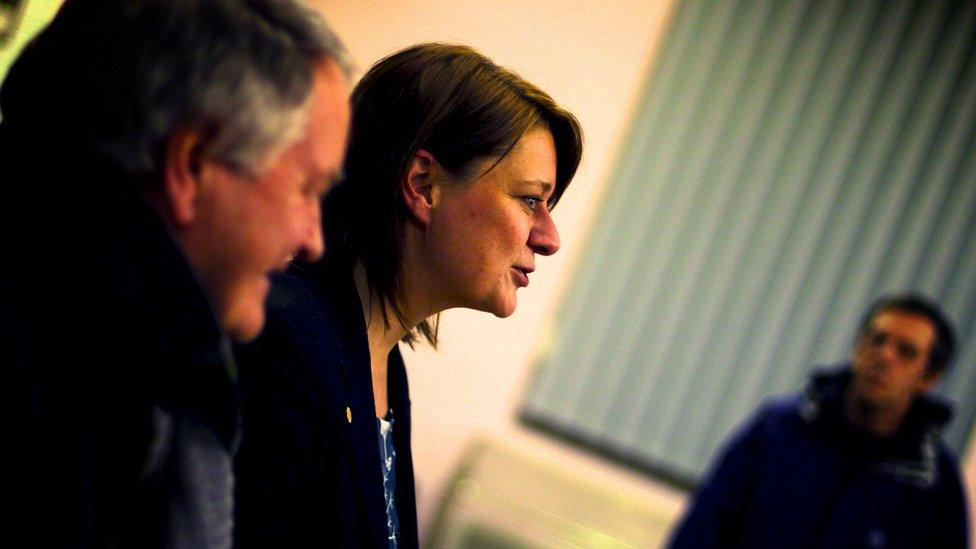
At the start of the leadership contest, she was an outside bet.
But enough Plaid members liked what they heard and read, choosing her as their first woman leader and the first leader not fluent in Welsh.
She took up the reins with a call to work towards "real independence".
She has a much higher profile than all previous Plaid leaders, thanks to her inclusion in the leaders' TV debates for the 2015 general election.
Lining up alongside David Cameron and Ed Miliband was, says an aide, a "huge deal".
Her team poured their efforts into preparing for the debates, trying to make sure that she left an impression in voters' minds that Leanne Wood was the voice of Wales.
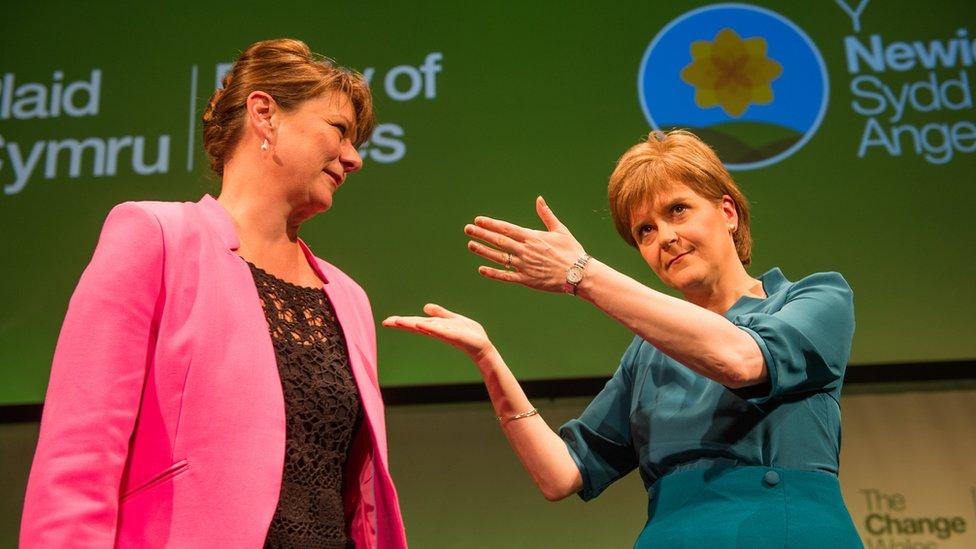
Scottish First Minister Nicola Sturgeon has praised Leanne Wood's performance as leader
Supporters say viewers liked her authenticity, pointing to good approval ratings as proof.
What they cannot do is point to seats won in parliament - Plaid still had only three MPs.
And although hopes were high in Plaid before last year's assembly election, the leader's victory in the Rhondda was its only advance. Plaid won 12 seats, the Tories 11 and Labour 29.

What others say
"I was proud of Leanne, I know you were proud of Leanne and I promise you I will always work with Leanne Wood in the best interests of our two countries," Scottish First Minister Nicola Sturgeon said at Plaid Cymru's conference in 2015.
Vice chair of British CND and friend John Cox: "She's a campaigner who happens to have become a leader of Plaid Cymru. But it's not like some people I've known who throughout their political lives have been climbing from one step to the next. She's not that sort of person. She's not a successful politician; she's a successful campaigner."
Former Pontypridd probation service colleague Rob Thomas described her as "a doughty fighter, who will not take no for an answer very easily".

Soon after the election, Conservative and UKIP AMs lent her their support, causing a dramatic tie between Ms Wood and Labour's Carwyn Jones in a vote to nominate the first minister.
It forced Labour to make concessions to Plaid, although there is no formal coalition between the two parties.
In reality, there was never any real prospect of Ms Wood becoming first minister last summer. She has ruled out ever working with the Conservatives, let alone UKIP.
Meanwhile, there's a debate within Plaid about the party's attitude towards Labour - something Ms Wood herself conceded when she said on the eve of a party conference last year that it was something Plaid was "actively considering… all the time".
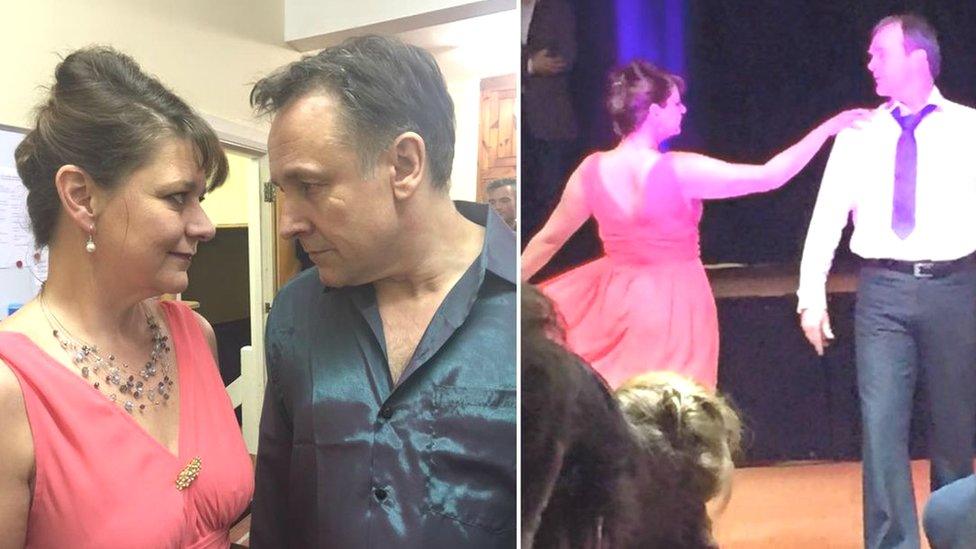
Leanne Wood won praise for her dance skills during a Strictly Cymru Dancing 2016 fundraiser, pictured with actor Richard Elfyn (l) and Plaid Cymru councillor and actor Danny Grehan
The current arrangement - in opposition, but sometimes working with Labour - probably puts Ms Wood in the centre ground of opinion in the party.
She campaigned with Mr Jones for a Remain vote in the EU referendum and helped draw up a Welsh Government plan for Brexit.
But her "project" is to eventually replace Labour.
The Scottish nationalists provide the blueprint - first become the biggest party, then build the case for independence.
Both goals are some way off and Plaid members are annoyed by unfavourable comparisons to the Scottish nationalists' success.
Defections mean Ms Wood no longer leads the largest opposition group in Cardiff Bay.
But positive results in local council elections have boosted Plaid's hopes of inflicting wounds on Labour in the snap general election on 8 June.
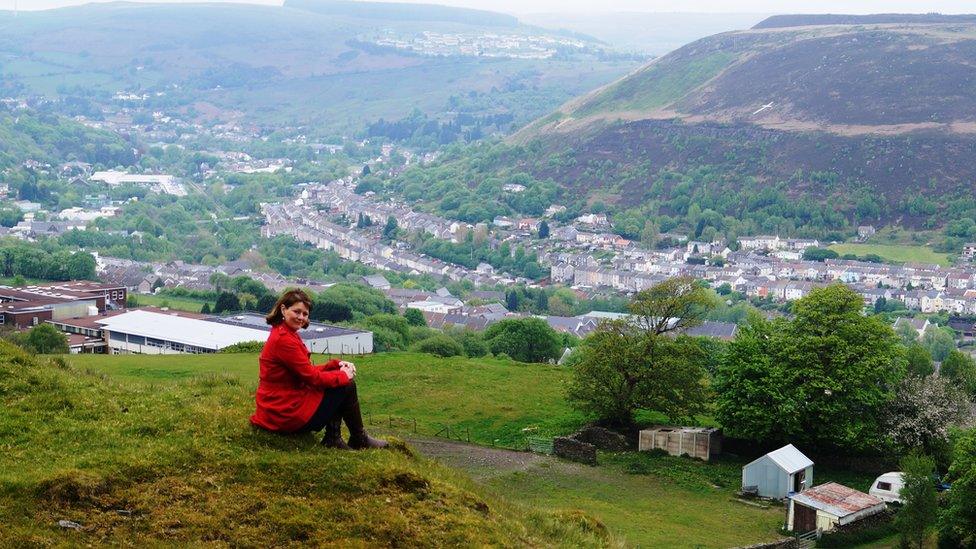
Looking down on the village of Penygraig in the Rhondda Valley
Before the local elections, she said her five years at the helm had seen its "ups and downs".
While campaigning, she has let rip with her anti-Tory convictions, asking voters to "defend Wales" from a Theresa May government.
And she pondered in public about whether she should stand as a Westminster candidate in the Rhondda, a move that would have required her to quit as party leader under current rules.
Eventually, she decided against.
Senior figures in Plaid privately told the BBC they were dismayed by her openly flirting with the idea.
Nevertheless, the Rhondda is one of two or three seats Plaid hopes to snatch from Labour on 8 June. If it does so, this election will be remembered as one of the bigger "ups" in Ms Wood's political career.
- Published23 April 2017
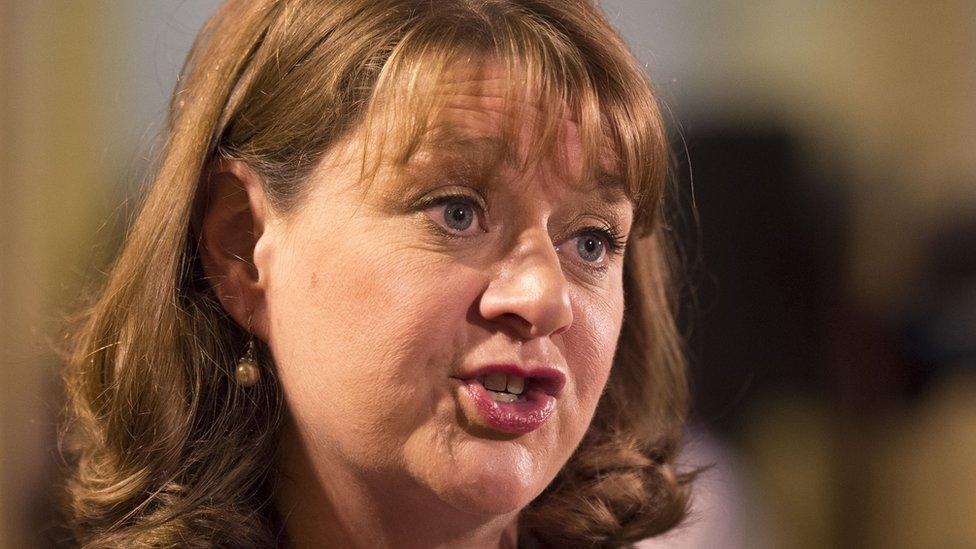
- Published16 May 2017
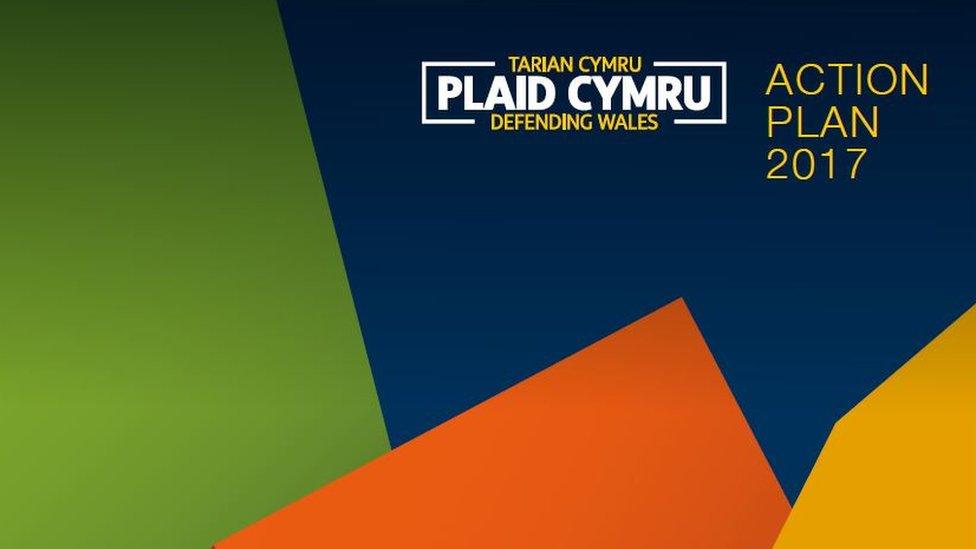
- Published15 May 2017
